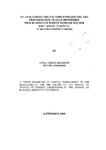An Analysis of the Factors Influencing the Performance of Self-Sponsored Programmes in Institutions of Higher Education in Kenya: (A Case of the University of Nairobi)
Abstract
Education is a social and interactive relationship. Academic governance, accessibility and quality
have become key academic performance indicators and subsequently a means of comparison amongst institutions and respective programmes. As competition for higher education shifts from
being the preserve of the public sector, these factors are bound to influence academic performance and evaluation globally and nationally, and therefore consumer perceptions of these services. Higher education in particular demands adequate resource and capacity development for effective service performance. In Kenya, consumers of higher education services particularly
self-sponsored programmes, expect a holistic approach that meets not only their intellectual needs but also social and community needs. Through a descriptive survey of 250 staff and
students of the University of Nairobi, this study examined and analyzed the factors that influence the performance of the self-sponsored progammes offered by the institution with a view to establishing consumer priorities. It established that consumers attach a greater value for a conducive academic environment especially facilities/equipment, interactive communication and
being treated with respect and dignity (empathy) in the delivery of academic services. It is therefore imperative that the university facilitates a more consultative and performance-based approach in the management and delivery of quality and relevant courses in respective programs as a package to stem any negative perceptions of being unresponsive to market and consumer dynamics.
Collections
- MKSU Masters Theses [146]

